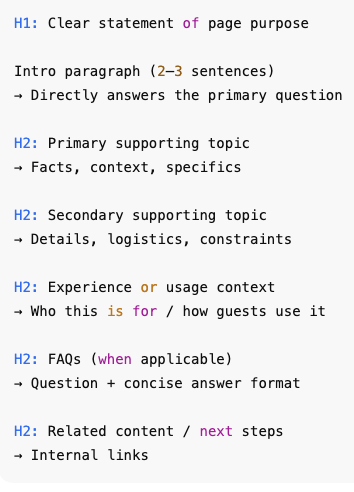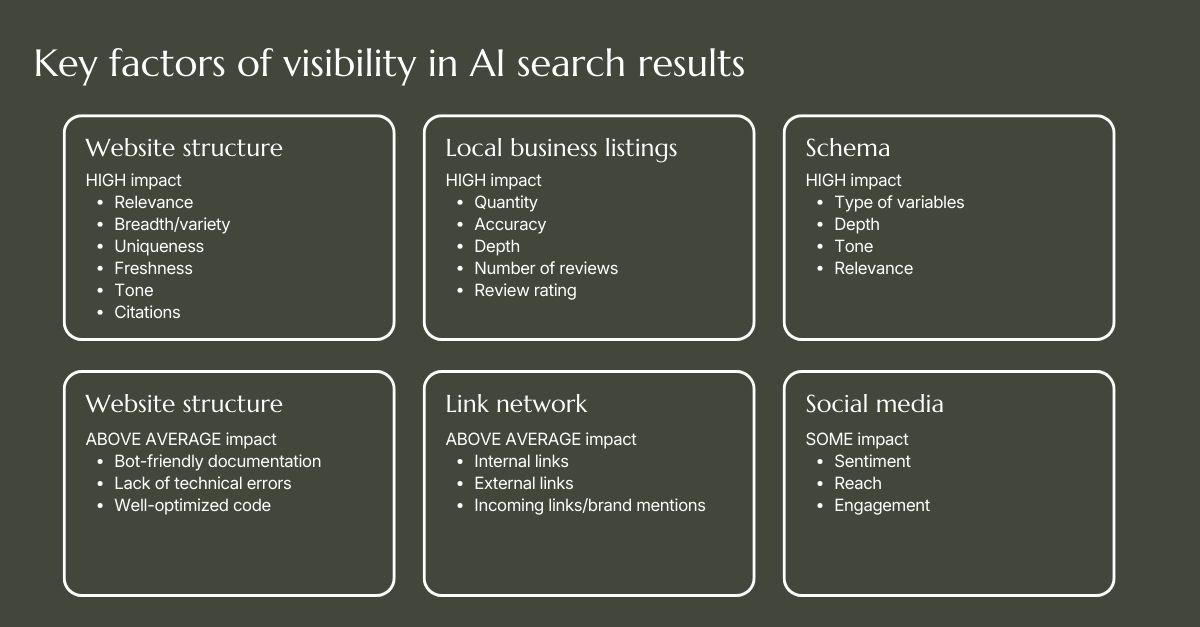How to write AI Search optimized content for hotels
Getting your hotel’s content and brand included in generative AI answer engines for relevant prompts comes down to ensuring it’s crawlable, well-structured, answers questions concisely and directly, and is contextually rich. But how does your hotel produce or revise its content to ensure it’s best structured for visibility in AI search engines?
Our team has put together this guide on how to write content that is well optimized for AI search engines, but doesn’t ignore the importance of traditional search engine optimization, which is still an essential tool for brand success and bookings.
1. Ensure each page is focused on a specific topic or intent focus
LLMs prefer clearly presented and specific content that answers a question. Prioritize developing pages focused on a specific topic, then answer that question directly and thoroughly.
Examples of pages with a clear, specific focus:
- Location page: focuses on specific information, providing direct answers about where this hotel is and what is nearby, including attractions, demand drivers, the airport, and more.
- Amenities page: what does this hotel offer, and who is it best for
- Pet-friendly page: highlights the policies and reasons why your hotel is a great choice for people travelling with pets
Tip: Avoid mixing sales copy, policies, and other content that doesn’t directly answer that intent
2. Consider using a standard, repeatable content format designed for LLMs and humans
Well-formatted content is not only beneficial for LLMs and AI visibility but also preferred by humans! It’s critical not to lose sight of optimization for people as well as bots. This structure enables AI engine bots to crawl and consume content in chunks while allowing humans to quickly scan and find the information and answers they are looking for on the topic.
An example of great LLM (and human) structured content could look something like:

These are a few examples of hotel page content structure types that do this well:
- Prompt: luxury Aspen hotels
- Prompt: Hotel near Point Loma San Diego
- Prompt: Historic Nashville Hotel
3. Your page intro paragraph should stand alone as an answer
A great start to an LLM (and human) structured content page is to use your opening paragraph as a standalone answer. Follow these guidelines:
- Strong intro paragraph rules for your hotel’s page
- 2–3 sentences max
- Clear, specific language (avoid vague, marketing language)
- Directly answers what, where, and who
- Example (for your hotel’s location page intro paragraph)
- ❌ “Experience the perfect blend of comfort and convenience in the heart of the city.”
- ✅ “The hotel is located in downtown Denver, two blocks from Union Station and within walking distance of restaurants, museums, and public transit.”
4. Treat each H2 section as an “answer node”
LLMs prefer a direct and clear response to a specific question. Use your page’s H2 header tags to do just that. Here’s how you can approach using your page’s H2s to answer specific questions or topics:
Here are some good H2 examples for your hotel’s content:
- “Where the Hotel Is Located”
- “Parking and Transportation Options”
- “Who This Hotel Is Best For”
- “Nearby Attractions and Distances”
- “What Guests Should Know Before Booking”
Here are some poor H2 examples for LLMs:
- “Why You’ll Love Staying With Us”
- “A Truly Unique Experience”
- “Luxury Redefined”
Optimizing page content for LLMs can produce similar concerns as optimizing for search engines. These bots prefer direct, informational text, which can conflict with a hotel brand’s preferred language and brand voice on the page. It’s important to consider this impact from both an AEO/SEO perspective and a brand voice perspective.
Tip: If an H2 cannot be phrased as a question, it’s probably weak for AI search optimization.
5. Keep paragraphs short and to the point
Just like humans in today’s short-attention-span world, LLMs prefer short and concise answers. Use this to guide your page’s paragraph length.
- Keep your page’s paragraph content to 2–3 sentences max
- Focus on answering just one idea per paragraph
- Utilize concrete details over adjectives or marketing jargon
Here’s an example showcasing a poorly crafted paragraph for LLMs vs a well-optimized one:
- ❌ “Our hotel offers convenient access to Nashville attractions while providing guests with a peaceful and comfortable stay thanks to our attentive staff and thoughtful design.”
- ✅ “The hotel is within a 10-minute walk of downtown Nashville attractions. Many guests choose the property for its quieter rooms compared to other downtown hotels.”
6. Use lists and tables
LLMs prefer content that is easily consumable in the format of tables, bullets, and numbered lists. This is because content formatted as lists helps LLMs identify attributes, steps, and groupings. As a human, it also makes the content much easier to scan, consume, and find what you’re looking for.
Here are a few ideas on the best uses for lists on your hotel’s pages:
- Amenities
- Room features
- Policies
- What’s included / not included
- Itinerary steps
Here’s a specific example for a hotel’s amenities page list section:
- Amenities Include:
- Complimentary Wi-Fi throughout the property
- On-site fitness center
- Underground self-parking (daily fee)
- Pet-friendly rooms (fee applies)
- This format makes it easy for AI to extract and restate.
7. Include a list of FAQs at the end of the page
Tieing into the understanding that LLMs prefer concise answers to specific questions, tap into this by adding a short FAQ content block to the end of your hotel’s page. When adding FAQs to your page, make sure to:
- Add around 3-5 FAQs
- State the question followed directly by a specific, informative answer
- Make sure the FAQs are related to answering questions about that page’s specific intent or topic
8. Use a natural language URL structure
The impact of keywords within URLs has diminished over time when it comes to traditional SEO. Interestingly enough, the use of natural language and specific keywords in URLs is proving to be more important for LLMs and AI search. Make sure to incorporate the full title of your content piece and use semantic URLs.
Here are a few good semantic URL structure examples:
- /best-family-friendly-activities-san-diego/
- /things-to-do-san-diego-mission-bay/
- /2-bedroom-san-diego-hotel-suite/
Here are a few examples of poor URL structure:
- /post?categoryid=18456
- /page13
- /product/roomtype1
9. Update past content and the publish date
Recency of content and publish date influence visibility in AI search. This includes revisiting and updating past content, such as itinerary guides and blogs, to reflect new information. Along with updating the content, make sure to update the publish date on the page.
10. Avoid JavaScript for rendering important page content
JavaScript-heavy pages are less likely to be cited or summarized in AI search engines. LLMs and AI crawlers prefer static pages and more often extract content from HTML. While JavaScript is acceptable for uses such as UI, form validation, and analytics, it should be avoided for rendering main content on the page or loading your hotel website’s primary navigation.
11. Incorporate citations and quote sources
Answer engines like Google AI Overviews and ChatGPT prioritize fact-based, well-sourced, and contextually reliable content. Citations and direct quotes support your content and signal credibility. For hotels, this can include:
- Quoting and linking to guest reviews
- Trust signals from awards like Conde Nast or TripAdvisor, and linking to the award page on the publisher
- On-property policies, certifications, and features that are verified by a 3rd party organization
Bonus tip: Looking for new content ideas, such as itineraries, features, amenities, and demand drivers that are important to your potential guests? Dig into your guest sentiment analysis to extract real guest insights on the likes, dislikes, reasons to stay at your property, and more.



